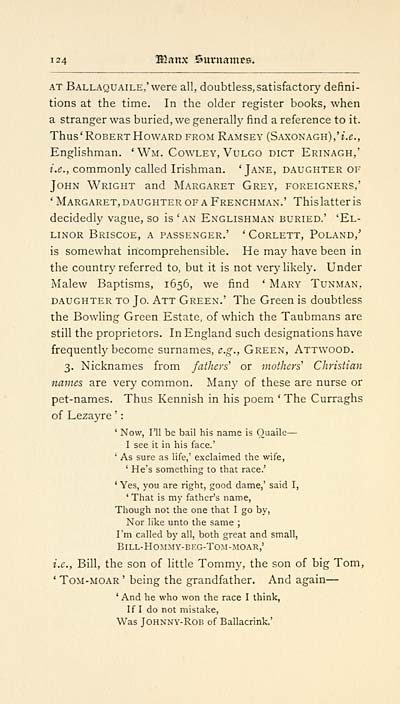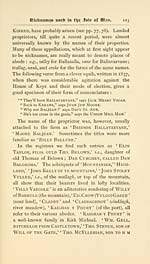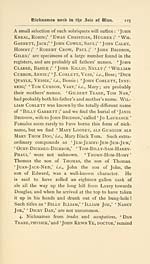Download files
Complete book:
Individual page:
Thumbnail gallery: Grid view | List view

[24 Ulanx Surnamca.
AT BALLAQUAiLE,'were all, doubtless, satisfactory defini-
tions at the time. In the older register books, when
a stranger was buried, we generall)' find a reference to it.
Thus 'Robert Howard from Ramsey (Saxonagh),'^.^.,
Englishman. *Wm. Cow^ley, Vulgo dict Erinagh,'
i.e., commonly called Irishman. 'Jane, daughter of
John Wright and Margaret Grey, foreigners,'
' Margaret, daughter of a Frenchman.' Thislatteris
decidedly vague, so is 'an Englishman buried.' 'El-
LiNOR Briscoe, a passenger.' ' Corlett, Poland/
is somewhat incomprehensible. He may have been in
the country referred to, but it is not very likely. Under
Malew Baptisms, 1656, we find ' Mary Tunman,
daughter to Jo. Att Green.' The Green is doubtless
the BowHng Green Estate, of which the Taubmans are
still the proprietors. In England such designations have
frequently become surnames, e.g., Green, Attwood.
3. Nicknames from fathers' or mothers' Christian
names are very common. Many of these are nurse or
pet-names. Thus Kennish in his poem ' The Curraghs
of Lezayre ' :
' Now, I'll be bail his name is Ouaile —
I see it in his face.'
' As sure as life,' exclaimed the wife,
' He's something to that race.'
' Yes, you are right, good dame,' said I,
'That is my father's name,
Though not the one that I go by,
Nor like unto the same ;
I'm called by all, both great and small,
BiLL-HOMMY-BEG-TOM-MOAR,'
i.e.. Bill, the son of little Tommy, the son of big Tom,
* Tom-moar ' being the grandfather. And again —
' And he who won the race I think,
If I do not mistake.
Was JOHNNY-ROB of Ballacrink.'
AT BALLAQUAiLE,'were all, doubtless, satisfactory defini-
tions at the time. In the older register books, when
a stranger was buried, we generall)' find a reference to it.
Thus 'Robert Howard from Ramsey (Saxonagh),'^.^.,
Englishman. *Wm. Cow^ley, Vulgo dict Erinagh,'
i.e., commonly called Irishman. 'Jane, daughter of
John Wright and Margaret Grey, foreigners,'
' Margaret, daughter of a Frenchman.' Thislatteris
decidedly vague, so is 'an Englishman buried.' 'El-
LiNOR Briscoe, a passenger.' ' Corlett, Poland/
is somewhat incomprehensible. He may have been in
the country referred to, but it is not very likely. Under
Malew Baptisms, 1656, we find ' Mary Tunman,
daughter to Jo. Att Green.' The Green is doubtless
the BowHng Green Estate, of which the Taubmans are
still the proprietors. In England such designations have
frequently become surnames, e.g., Green, Attwood.
3. Nicknames from fathers' or mothers' Christian
names are very common. Many of these are nurse or
pet-names. Thus Kennish in his poem ' The Curraghs
of Lezayre ' :
' Now, I'll be bail his name is Ouaile —
I see it in his face.'
' As sure as life,' exclaimed the wife,
' He's something to that race.'
' Yes, you are right, good dame,' said I,
'That is my father's name,
Though not the one that I go by,
Nor like unto the same ;
I'm called by all, both great and small,
BiLL-HOMMY-BEG-TOM-MOAR,'
i.e.. Bill, the son of little Tommy, the son of big Tom,
* Tom-moar ' being the grandfather. And again —
' And he who won the race I think,
If I do not mistake.
Was JOHNNY-ROB of Ballacrink.'
Set display mode to: Large image | Transcription
Images and transcriptions on this page, including medium image downloads, may be used under the Creative Commons Attribution 4.0 International Licence unless otherwise stated. ![]()
| Early Gaelic Book Collections > Blair Collection > Surnames & place-names of the Isle of Man > (142) |
|---|
| Permanent URL | https://digital.nls.uk/82101352 |
|---|
| Description | A selection of books from a collection of more than 500 titles, mostly on religious and literary topics. Also includes some material dealing with other Celtic languages and societies. Collection created towards the end of the 19th century by Lady Evelyn Stewart Murray. |
|---|
| Description | Selected items from five 'Special and Named Printed Collections'. Includes books in Gaelic and other Celtic languages, works about the Gaels, their languages, literature, culture and history. |
|---|

